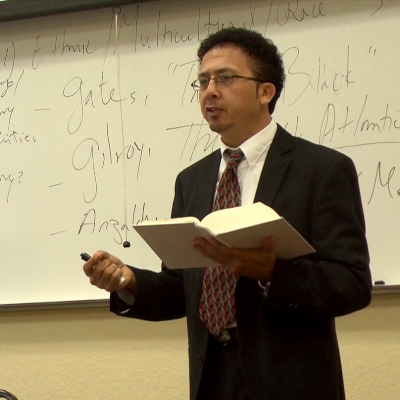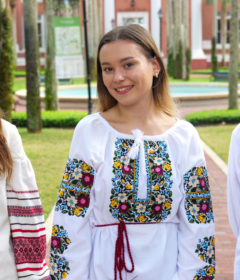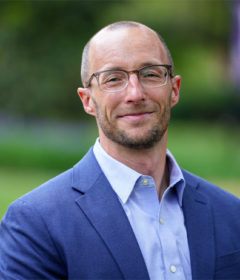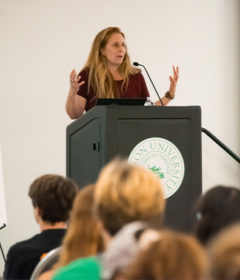“Part of No Part”
 Jamil Khader’s year-long Fulbright fellowship will take him to a volatile part of the world to seek extraordinary writers and help increase understanding of Palestinian culture and social justice.
Jamil Khader’s year-long Fulbright fellowship will take him to a volatile part of the world to seek extraordinary writers and help increase understanding of Palestinian culture and social justice.
An uncommon, and uncommonly personal, quest into the rocky hills north of the Dead Sea is being prepared by a Stetson English professor who plans to spend the next year seeking uncommon literary voices on the edges of Palestinian culture.
The research is underwritten by the Fulbright Program and will be carried out by English professor Jamil Khader, Ph.D., who’ll explore facets of the deep, multi-layered Palestinian society to promote greater comprehension of the universal human condition and social justice.
“I hope to contribute to a more complex understanding of Palestinian culture and the humanity of Palestinians beyond the destructive stereotypical representations that dominate media and public discourse,” said Khader, Gender Studies director and former Diversity Council co-chair, and recipient of the Stetson University Hand Award for Scholarship (2006) and the Stetson University Hand Award for Community Impact (2011).
Khader is one of six Fulbright scholars from Stetson since 1998. He has authored one book, co-edited another and is writing a third. He’s an expert in postcolonial studies, transnational feminism, human rights, globalization, literary theory and popular culture.
This project, “The Part of No Part: Marginality in Palestinian Literature,” ties into his work on postcolonial turbulence and restrictive social orders in Africa, the Caribbean, the Middle East and the Americas. Specifically, he’s interested in those writers largely marginalized by the dominant forces of their world, even generations after traumatic and life-shattering events.
They’re a real part and reflection of their culture, but not part of the mainstream, don’t want to be and couldn’t be even if they wished, Khader says. They are “a part of no part.”
Teaching at Bir Zeit University near Ramallah is part of the Fulbright fellowship. While there, Khader will search out, meet and interview a broad base of Palestinian writers who aim to resolve contradictions between dominant narratives of neoliberal economic policies and the collective memory of the traumatic scattering and ethnic cleansing of 1948, commonly known as the Nakbah.
Taking into account the controversial and political nature of these issues, Khader will examine the range of ideological positions adopted by Palestinian writers. Some adapt hybrid and cosmopolitan strategies; others reimagine new forms of communal coexistence in Palestine and Israel.
Khader’s own history and character are shaped by the memories of his family, who were caught in the destruction, diaspora and death along the coast south of Haifa. A native Palestinian, he was raised in a resettled community and educated in Haifa before he was awarded a Fulbright scholarship to Pennsylvania State University and earned a Ph.D. in 1998.
“My scholarship cannot be disconnected from my own social and political views and commitment to social justice,” said Khader, who has published on wide-ranging cultural problems such as sexism, racism, colonialism, homophobia and Islamophobia, identifying possible ways to form solidarities across differences.
Academics like himself, said Khader, may not change the world, but “we can help illuminate invisible pockets of existence and humanity that deserve urgent attention.” That’s a worthy purpose, he said, echoing the words of Reverend Martin Luther King: “Injustice anywhere is a threat to justice everywhere.”
“What interests me,” Khader said, “is the question of how those individuals and communities who remain inherently excluded articulate their experiences and what these experiences teach us about the limits of universality and the possibility of meaningful social change.”
Even though Khader is familiar with the territory, has friends and family there and speaks Hebrew and Arabic, the project poses many challenges, not the least of which will be to find and build relationships with writers in a volatile military-occupied area of armed patrols, checkpoints, no man’s land, curfews, endemic suspicion and walls inhibiting free movement.
His wife and daughters are excited about living in West Bank and immersing themselves in a decidedly non-DeLand culture, but their security adds an element of anxiety for Khader: “I will be concerned first and foremost for their safety,” he said. They’ll probably live in Ramallah, a mostly Muslim/Christian city of some 30,000 just six miles north of Jerusalem.
The research will result in scholarly articles and lectures, Khader told the Fulbright Committee, and form the basis for a book on contemporary Palestinian identity. It will help him extend involvement in Stetson’s values mission, contribute to cross cultural understanding, promote direct dialogue and collaboration between students in the Palestinian Territories and Stetson and facilitate more effective strategies to bridge the international gap in academic systems and help Stetson students prepare to study abroad.
by Ronald Williamson



